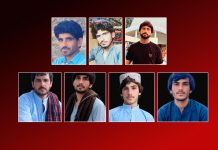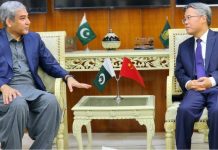By Internationalist Commune of Rojava
On February 12th and 13th, Pakistan’s Prime Minister, Shehbaz Sharif, hosted Turkish President Recep Tayyip Erdogan for the seventh session of the Pakistan-Turkey High-Level Strategic Cooperation Council (HLSCC). The meeting focused on strengthening ties in areas such as defense, security, and trade, with counter-terrorism at the forefront. The discussions indicate an increasing coordination of military strategies between the two nations, signaling a potential escalation in the suppression of local populations, particularly women, who continue to resist oppressive regimes. Their alliance is aimed at bolstering mutual support amidst a shifting geopolitical landscape and the intensification of global conflicts. To fully understand the dynamics of this partnership, we must consider the larger context of the ongoing Middle East crisis and the roles of both countries within it.
The conflict in Gaza has deepened an ongoing upheaval across the Middle East, extending from the Mediterranean to the Indus River. This crisis has roots in U.S. interventions dating back to the 1990s, particularly in Iraq, and reached a new peak with the collapse of the Syrian regime by the end of 2024. The consequences of these events suggest that the region is undergoing a process of reorganization that mirrors the post-World War I restructuring. At that time, the dismantling of empires led to the creation of nation-states built on the European model, which served to further embed capitalism on a global scale. Both Turkey’s establishment in 1923 and Pakistan’s creation in 1947 were shaped by this historical context. These nations were formed around the idea of a homogeneous state, where any form of ethnic or religious diversity was seen as a threat, and power was consolidated under a centralized authority.
The survival of these nation-states, which cling to outdated notions of power and reject the process of democratization, has created a situation where imperial interests have driven the need for a regional reorganization. This shift serves to support both trade and energy routes promoted by global powers like the U.S. and China. Pakistan and Turkey, as regional powers, are attempting to preserve their influence, but rather than addressing the internal issues of democracy and unity, their regimes have opted to continue oppressing ethnic minorities and women.
The Long History of Pakistan-Turkey Relations
The relationship between Turkey and Pakistan is deeply rooted in history, far predating the formation of their respective nation-states, and initially centered on shared religious ties—primarily Sunni Islam. During World War I, for instance, Muslims in British India raised funds to support the Ottoman Empire’s war efforts. Following Pakistan’s creation, Turkey was one of the first countries to formally recognize it. The founders of Pakistan viewed the creation of the Turkish Republic as a model for successful independence. Over time, this relationship, initially grounded in religious solidarity, evolved into a strategic alliance driven by political and military interests, particularly given both countries’ histories of colonialism and genocide against their indigenous peoples.
In addition, both countries share a common adversary in Iran, which further strengthens their bond. Their growing ties became more pronounced with the establishment of the Pakistan-Turkey High-Level Strategic Cooperation Council (HLSCC) in 2009. This council was designed to formalize their political, economic, and trade relations. Since Erdogan’s rise to power, the relationship has taken on a more openly political and ideological nature. Erdogan’s vision of reviving the “New Ottoman Empire” has led to aggressive military campaigns against the Kurdish population both within and outside Turkey’s borders, as well as the occupation of parts of Syria and Iraq. On the other hand, Pakistan has aligned itself with China to secure its position in the region, opening its land and resources to foreign investment while defending these ventures against local resistance. This strategy also helps Pakistan counter its long-standing rival, India.
War and Occupation: The Shared Military Agenda
One of the key areas of focus in Turkey-Pakistan cooperation is their growing military collaboration, which translates to greater involvement in warfare and occupation. Turkey has become one of Pakistan’s major suppliers of military hardware, including drones such as the Bayraktar and advanced fighter jets like the KAAN. The two countries are also discussing the creation of a joint arms manufacturing facility. Turkey has employed drones extensively in its ongoing conflict with the Kurdish PKK, targeting both military infrastructure and civilian areas in Syria in an effort to weaken the region’s autonomous governance. Despite limited success, Pakistan is expected to increasingly utilize these weapons against insurgents in Balochistan and other regions within its own borders. The development of a shared arms industry between the two nations is primarily geared towards maintaining oppressive regimes, characterized by violence, colonialism, and the marginalization of women.
A Call for Resistance: Building a Counter-Narrative for the People
The crisis facing these two regimes presents an opportunity for the oppressed populations of the region to build their own political alternatives. The relentless campaigns waged by Pakistan and Turkey against their own citizens reflect the final, desperate attempts of dying powers. Resistance movements have the potential to challenge these regimes and force political concessions, especially as they fear losing their place within the broader imperialist framework. As these countries strengthen their military cooperation, it is crucial that those fighting for freedom also form stronger alliances—politically, militarily, and diplomatically. This challenge extends not only to the oppressed ethnic groups such as the Kurds and Balochs but to all the citizens of these states.
The people of these countries are confronted with the devastating reality that their governments rely on war and an economy built upon the exploitation of their land. In the long run, this will likely lead to a crisis that could result in state collapse. These populations are at risk of being commodified as part of the ongoing imperialist reorganization of the region.
For this reason, it is essential to develop a vision that challenges the crumbling system of centralized power and patriarchy. A federal, multi-ethnic model that is grounded in the freedom of women offers a way out of the crisis. This model would enable the diverse peoples of the region to live together in peace, united by ecological principles that ensure the sustainability of their lands for future generations. Abdullah Öcalan’s idea of a Democratic Middle East Confederation offers an alternative to the imperialist-driven division of the region and the sectarian politics of regional powers. In this vision, the freedom of women plays a central role in establishing peace, countering the fundamentalist forces that perpetuate violence and darkness.
The Internationalist Commune of Rojava is part of the Apoist Youth Movement and based in North-East Syria. Internationalists from different parts of the world are organized in the commune. Its members work in the civil society on the ground and build relations with revolutionary and progressive youth movements all over the world.
Disclaimer: The views and opinions expressed in this article are those of the author and do not necessarily reflect the official policy or position of The Balochistan Post or any of its editors.






























